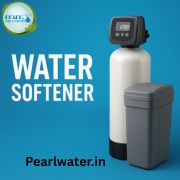Sediment Filter – Price, Uses & Benefits | Pearl Water Technologies
Introduction
If your water contains visible dirt, rust, or cloudy particles, a sediment filter might be the hero you didn’t know you needed. At Pearl Water Technologies, we provide top-quality sediment filters that remove suspended solids, protect water appliances, and enhance the performance of RO, UV, and other filtration systems. In this blog, we’ll explore what sediment filters are, their benefits, pricing, and why choosing the right one matters for long-term water quality.
What is a Sediment Filter?
A sediment filter is a filtration device designed to remove solid particles from water — including sand, dirt, silt, and rust — before they reach more sensitive filtration stages like RO membranes or UV chambers.
Why Are Sediment Filters Important?
Prevents clogging of other filters
Improves water clarity
Protects appliances and plumbing
Extends RO membrane life
Types of Sediment Filters Offered by Pearl Water Technologies
1. Spun Filter Cartridges
Made of polypropylene fibers for fine particle removal.
2. Pleated Sediment Filters
Reusable filters with high dirt-holding capacity.
3. String Wound Filters
Great for removing coarse particles in industrial water.
4. Melt Blown Filters
High efficiency for fine sediment filtration.
How a Sediment Filter Works
Water flows through the filter media, trapping suspended particles while allowing clean water to pass. The micron rating determines how small the particles removed will be.
Micron Ratings & Their Impact
20 Micron – Removes large particles like sand
10 Micron – Captures smaller particles like silt
5 Micron – Ideal for fine dirt and rust removal
Sediment Filter Price – Pearl Water Technologies
At Pearl Water Technologies, sediment filter prices start as low as ₹200 for domestic use and can go up to ₹2,000 or more for high-capacity industrial cartridges. Factors affecting price include:
Filter size
Micron rating
Material type
Application (domestic, commercial, industrial)
Benefits of Pearl Water Sediment Filters
Durable materials
High dirt-holding capacity
Compatible with multiple systems
Affordable replacement cost
How Often Should You Replace a Sediment Filter?
Generally, every 6–12 months, but it can vary depending on water quality and usage.
Maintenance Tips
Regularly check filter condition
Replace when water flow decreases
Avoid exceeding manufacturer’s recommended usage period
Sediment Filter vs. Carbon Filter
Sediment Filter – Removes physical particles
Carbon Filter – Removes chemicals, chlorine, odor, and taste
Where to Use Sediment Filters
RO water purifiers
Industrial water treatment plants
Whole-house filtration systems
Commercial kitchens
Why Choose Pearl Water Technologies
With years of expertise in water treatment solutions, we offer custom-sized filters, competitive pricing, and reliable performance for all water filtration needs.
Conclusion
A sediment filter is the first line of defense in water purification. Choosing a Pearl Water Technologies sediment filter ensures cleaner water, longer-lasting appliances, and cost savings in the long run.
FAQs
1. Can a sediment filter improve taste?
Not directly — it removes particles, not chemicals.
2. How do I know if my filter needs replacement?
If water pressure drops or looks cloudy, it’s time to change.
3. Is installation difficult?
Most sediment filters are easy to install with basic tools.
4. Do I need a sediment filter for borewell water?
Yes, borewell water often has sand and silt.
5. Can I wash and reuse a sediment filter?
Pleated filters can be cleaned; spun cartridges are typically disposable.



